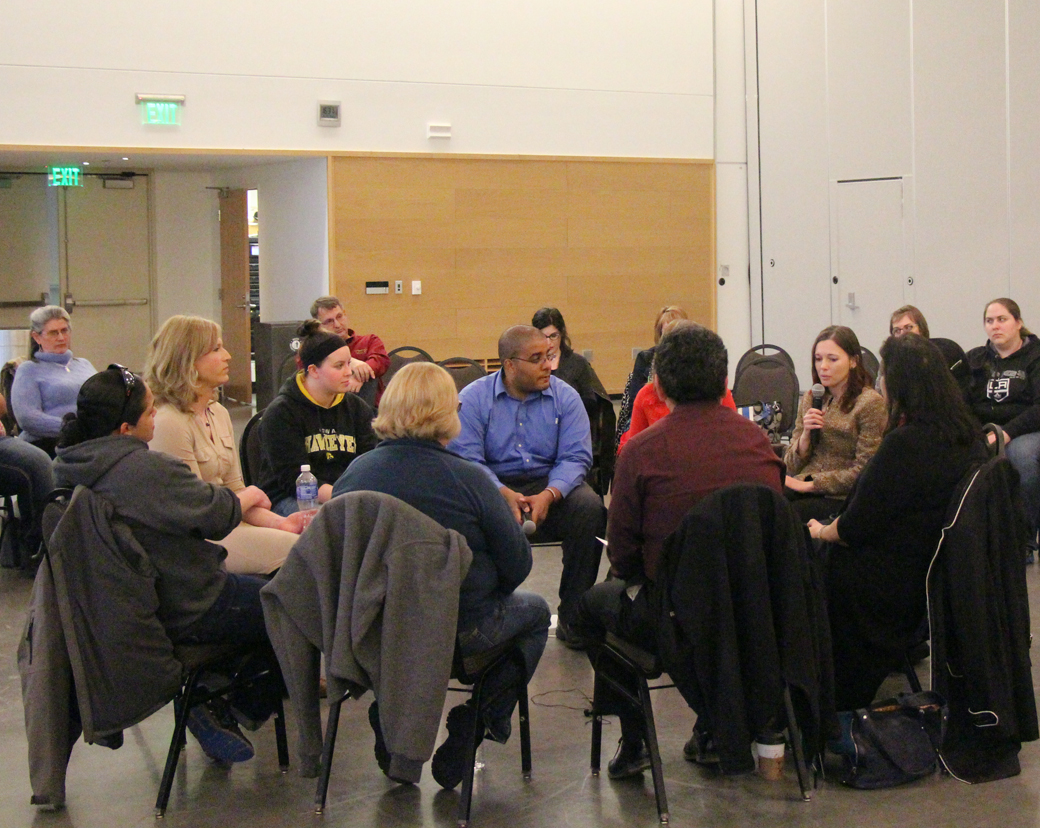
‘Bitch’ magazine editor speaks up for ‘Voices of the Silenced’
The nursery rhyme “sticks and stones may break my bones, but words will never hurt me” may still be passed around the schoolyard, but at the third Diversity Symposium March 27, negative portrayals of race, gender and sexuality cannot just be brushed aside.
“Well, it’s the 21st century, and there is plenty of research showing that words and images can hurt people, both at the individual and at the social level,” said Miglena Sternadori, coordinator of the Women and Gender Studies program at the University of South Dakota.
Sternadori introduced the day’s keynote speaker Andi Zeisler, editor of the magazine, “Bitch: Feminist Response to Pop Culture.” She kicked off the symposium’s series of workshops and activities in the Muenster University Center with its theme, “We are the Voices of the Silenced.”
Since 1996, “Bitch” magazine has published critical essays that analyze and provide commentary on TV, film, music, advertising and more. With a readership of 80,000, it is one of few publications available that mix reported pieces, reviews and interviews surrounding contemporary feminism discourse.
In her keynote presentation at the Diversity Symposium, entitled “Don’t Just Change the Channel: Why Pop Culture Matters to Feminism, Activism and Social Justice,” Zeisler addressed how media and pop culture are inescapable.
It is a matter of ‘not hating the media, but making the media’ to present women as they are, three dimensional beings, she said.
Zeisler is the cofounder of Bitch Media, the author of “Feminism and Pop Culture” and the coeditor of “BitchFest: Ten years of Cultural Criticism from the Pages of Bitch Magazine.” Her work has also been featured in numerous newspapers and magazines, including Mother Jones, the San Francisco Chronicle and the Washington Post.
“People think (Bitch Magazine) is about man bashing, and it’s something ugly — but it’s not,” Zeisler.
Just “turning the channel” when someone witnesses sexism in pop culture is not the answer, she said. It is the sexualization of girls with dolls like scantily-clad Bratz that need to be talked about. People instead need to capitalize, because these are the “opportunities to make media and pop culture a better, more diverse world are all around us.”
“Feminism’s image problem was something we wanted to up-end (with Bitch magazine),” Zeisler said.
The symposium’s agenda also consisted of five workshops that ranged from “What Does it Mean to be Transgendered” to “Dangerous Dates and Relationship Deal Breakers.” The final event was a “fishbowl” discussion facilitated by Associate Vice President for Diversity Jesús Treviño involving people representing all walks of life “to create greater intergroup understanding.”
The Diversity Symposium was founded by Tiospaye, the Native American Student Council, and has expanded its sponsors to include groups like Spectrum: Gender and Sexuality Alliance, the Association for the Advancement of Women’s Rights and the Union of African American Students.
University events like the Diversity Symposium or Voices of Discovery sessions are providing the platforms for open discussions on difficult subjects about inclusivity, Treviño said.
“We are in this society, and we struggle with language, we struggle at explaining our ideas. We need these kind of outlets as a community,” Treviño said.
A continuous showing of the film “Girl Rising” and follow-up discussion was also a highlight of the symposium, and was sponsored by AAWR, USD’s women’s group. The video focused on the inspirational stories of nine girls from around the world who fought for their education and freedom.
AAWR President Mariah Bloom said by hosting the viewing and taking part in the symposium, she hopes students go back to their respective organizations and start open discussions with the tools to engage other students to respond and take part in talking about diversity.
“I get frustrated at times because of a lack of awareness on campus. People hear diversity, and they immediately say they aren’t prejudice and they haven’t prejudice,” Bloom said. “But if you are ignoring it, you aren’t your part in making campus inclusive.”
Photo: Faculty members, students and community members participate in a fishbowl discussion on diversity issues March 27 in the Muenster University Center Ballroom. (Malachi Petersen/The Volante)


